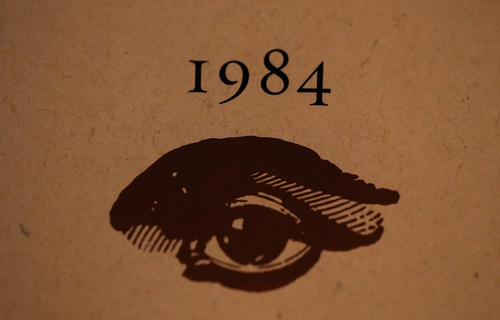From free speech to "spheres of influence" to our passion for endless war, we've become the doublethinkers 1984 predicted...

To know and not to know, to be conscious of complete truthfulness while telling carefully constructed lies, to hold simultaneously two opinions which canceled out, knowing them to be contradictory and believing in both of them… To forget whatever it was necessary to forget, then to draw it back into memory again at the moment when it was needed, and then promptly to forget it again… that was the ultimate subtlety.
In the last weeks, Russia took an already exacting speech environment to new extremes. A law was passed that would impose 15-year prison sentences for anyone spreading “fake news” about the Ukraine invasion; access was cut to Facebook and Twitter; stations like Echo Moskvi and TV Rain as well as BBC Russia, Radio Liberty, the New Times, Deutsche Welle, Doxa, and Latvia-based Meduza were effectively shut down; Wikipedia was threatened with a block over its invasion page; and national authorities have appeared to step in to prevent coverage of soldiers killed in the war, requiring local outlets to use terms like “special operation” instead. The latter development is connected to the state media regulator, Roskomnadzor, issuing a remarkably desperate dictum requiring news outlets to “use information and data received by them only from official Russian sources.”
Russia also appears in the middle of a general crackdown on local media, not so much because those outlets are dissenting, but because they’re more likely to provide indirect evidence of war failures or the effect of sanctions. The desperation to control news has grown to the point where Russian diplomats in foreign countries are pressuring state outlets in countries like Iran to stop using the term “war” to describe what’s going on in Ukraine.
On the flip side, a slew of actions have been taken to crack down on “fake news” and “misinformation” in the West. The big one was the European Union banning RT and Sputnik:
Due to the ongoing war in Ukraine, we’re blocking YouTube channels connected to RT and Sputnik across Europe, effective immediately. It’ll take time for our systems to fully ramp up. Our teams continue to monitor the situation around the clock to take swift action.
— Google Europe (@googleeurope) March 1, 2022
Facebook, Twitter, TikTok, and YouTube also cut access to all Russian state media, because the EU sanctions also required that internet platforms delist any RT or Sputnik content, even from individuals. The statute reads, “As regards the posts made by individuals that reproduce the content of RT and Sputnik, those posts shall not be published, and if published, shall be deleted.”
Other governments across the West, from Australia to Canada, have taken similar actions. In the U.S., Google and YouTube disallowed Russian state media ads (following a request by Senator Mark Warner) and demonetized “a number of Russian channels,” including RT but also many non-Russian individuals, before proceeding to demonetize all individual Russian content creators, even the individuals opposing the invasion. Even DuckDuckGo, the speechier, more pro-privacy alternative to Google, announced it was de-ranking “sites associated with Russian disinformation.” A growing list of Westerners have seen accounts frozen for supposed parroting of Russian talking points or “abusive” commentary.
YouTube banned Oliver Stone’s documentary Ukraine on Fire, while Netflix is going so far as to shelve a production of Anna Karenina. In what might have been the craziest move of all, Meta reportedly followed up a decision to un-ban the neo-Nazi Azov Battalion with a mind-blowing decision to alter its hate speech policies to “allow Facebook and Instagram users in some countries to call for violence against Russians and Russian soldiers in the context of the Ukraine invasion,” according to internal emails seen by Reuters.
One would hope there would be at least a few Americans left who’d hear about Russia barring the BBC and Voice of America and at least recognize the sameness of the issue involved with banning RT and Sputnik. Or, seeing how pathetic and manipulative it is for Russians to prevent reporting on war casualties, we’d recall the folly of the ban we had for nearly twenty years on photographs of military coffins, or the continuing pressure on embeds to avoid publishing images of American deaths from our own war zones. We should be able to read that Twitter and Facebook are cracking down on the “fake accounts” spreading “misinformation” that “Ukraine isn’t doing well” and notice that Russia’s measures against “fake news” and “disinformation” about its own military failures — though far more draconian and carrying much more severe penalties — are rooted in the same concept.
We don’t, however, because we long ago reached the doublethink phase predicted by Orwell, where most of the population is conscious of double standards but ignores them effortlessly. A healthy person should be able to be horrified by what’s happening in Russia and also see a warning about the degradation that ensues from using “pre-emptive” force, or from trying to control discontent by erasing expressions of it. But years of relentless propaganda have trained Americans to doublethink their way

No comments:
Post a Comment